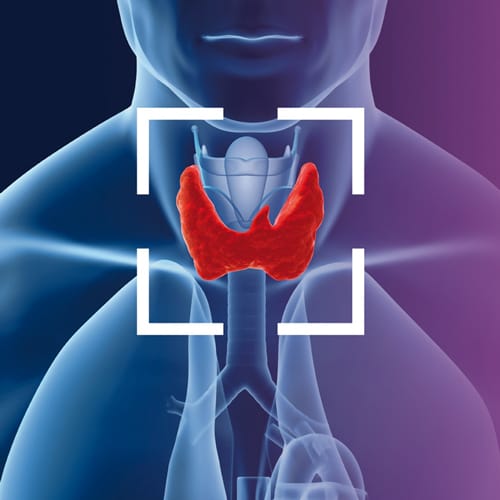Thyroid Markers for Diseases in Endocrinology
B·R·A·H·M·S thyroid biomarkers help evaluate the effectiveness of treatment
 Thyroid diseases rank among the most frequent medical conditions. As a result, they do not only affect the quality of life of the individual patient but also impose considerable costs on society as a whole. Depending on iodine supply, or lack thereof, up to 50% of the total population experience an enlargement of the thyroid gland, also known as goiter. Nodular alterations are found in 5 to 25% of the population, with the frequency increasing in line with age.
Thyroid diseases rank among the most frequent medical conditions. As a result, they do not only affect the quality of life of the individual patient but also impose considerable costs on society as a whole. Depending on iodine supply, or lack thereof, up to 50% of the total population experience an enlargement of the thyroid gland, also known as goiter. Nodular alterations are found in 5 to 25% of the population, with the frequency increasing in line with age.
For thyroid diseases, measurement of in vitro parameters is key to diagnosis, differential diagnosis and clinical decisions to be made in the course of the condition. Thermo Scientific B·R·A·H·M·S Biomarkers is a market leader for a variety of tests, such as the TSH receptor antibody test (TRAK).
Hyperactivity of the thyroid gland (hyperthyroidism) and thyroid insufficiency (hypothyroidism)
Hyperactivity of the thyroid gland (hyperthyroidism) occurs with a prevalence of approx. 0.5 to 2%. In regions with iodine shortage, thyroid autonomy is the dominant condition while Graves’ disease (exophthalmic goiter) is more frequent in areas with normal or abundant iodine supply. Thyroid insufficiency (hypothyroidism) is found in approx. 0.2 to 1.3% of the population. In many cases, this condition is caused by an autoimmune process. (Autoimmune thyroiditis or Hashimoto’s disease).
For the assessment of the activity of the thyroid gland B·R·A·H·M·S Biomarkers offers the most common assays such as Total T3 and Total T4 as well as free T3 (fT3) and free T4 (fT4). In addition to that we are also able to provide special assays, for example TBG. With these assays we offer our complete portfolio of radioimmunoassays in thyroid indications.
Confidence in the follow-up of thyroid cancer patients with B·R·A·H·M·S hTg sensitive KRYPTOR
Carcinomas of the thyroid occur in 10 to 30 per million people, accounting for 0.5 to 1.5% of all cancerous diseases. In 80% of all cases, these are differentiated thyroid carcinomas with a relatively good prognosis, provided the disease is diagnosed at an early stage and carefully followed up. For follow-up of thyroid cancer B·R·A·H·M·S Biomarkers offers a variety of assays formats of human thyroglobulin (hTg) and thyroglobulin antibodies (anti-Tg) both manual assays as well as automated .
Differential thyroid carcinoma (DTC) is the most common endocrine cancer worldwide with an ever increasing prevalence. The initial treatment consists of total thyoidectomy usually followed by ablation of thyroid remnant mit radioiodine. For a reliable and effective monitoring of patients for recurrent or persistent disease, circulating thyroglobulin (hTg) is used as a biochemical marker. As thyroid cells are the only source of hTg, it is highly specific for DTC and recommended for use as biomarker by internatinoal clinical practice guideline.
Due to the outstanding design the quality of our B·R·A·H·M·S hTg sensitive KRYPTOR assay enables laboratories to measure extremely low concentrations: it offers excellent sensitivity (LOQ: 0,15ng/ml, clinical equivalent to other high sensitive assays [Giovanella et al., 2014]) that drastically reduces the need for rhTSH stimulation of patients. Unlike other thyroglobulin assays the B·R·A·H·M·S hTg sensitive does not over-estimate patients' hTg levels, it provides results that are comparable to those measured by mass spectrometry.
The unique mini-recovery concept for our hTg sensitive KRYPTOR assay guarantees the most efficient and effective classification of "valid" and "invalid" Tg results in therapy follow-up of differentiated thyroid carcinoma by showing all possible interferences.
B·R·A·H·M·S TRAK human KRYPTOR is the diagnostic gold standard in Graves’ disease
With the introduction of the highly sensitive Thermo Scientific B·R·A·H·M·S TRAK human KRYPTOR assay in 1999, using immobilized recombinant human TSH receptors, a remarkable improvement for differential diagnosis of Graves' disease was achieved.
More about B·R·A·H·M·S TRAK human in Graves’ disease >
Hashimoto’s thyroiditis
Hashimoto's thyroiditis is another autoimmune disease of the thyroid gland. The destruction of thyroid tissue ultimately causes hypothyroidism characterized by a multitude of metabolic symptoms. For Hashimoto’s disease the presence of autoantibodies against thyroid proteins is characteristic, most prominent targets are TPO and - to a lesser extent - also thyroglobulin (Tg). The severity of thyroiditis can be assessed with help of B·R·A·H·M·S anti-TPOn and B·R·A·H·M·S anti-Tgn assays. Due to the use of native assay components both assays achieve improved analytical sensitivity and specificity.
Further links on Endocrinology
- Deutsche Gesellschaft für Endokrinologie (DGE – German Society of Endocrinology) >
- European Thyroid Association (ETA) >
- The American Thyroid Association (ATA) >
- Latin American Thyroid Society (LATS) >
- B·R·A·H·M·S GmbH is a member of Deutsche Gesellschaft für Nuklearmedizin (DGN – German Society of Nuclear Medicine) >
